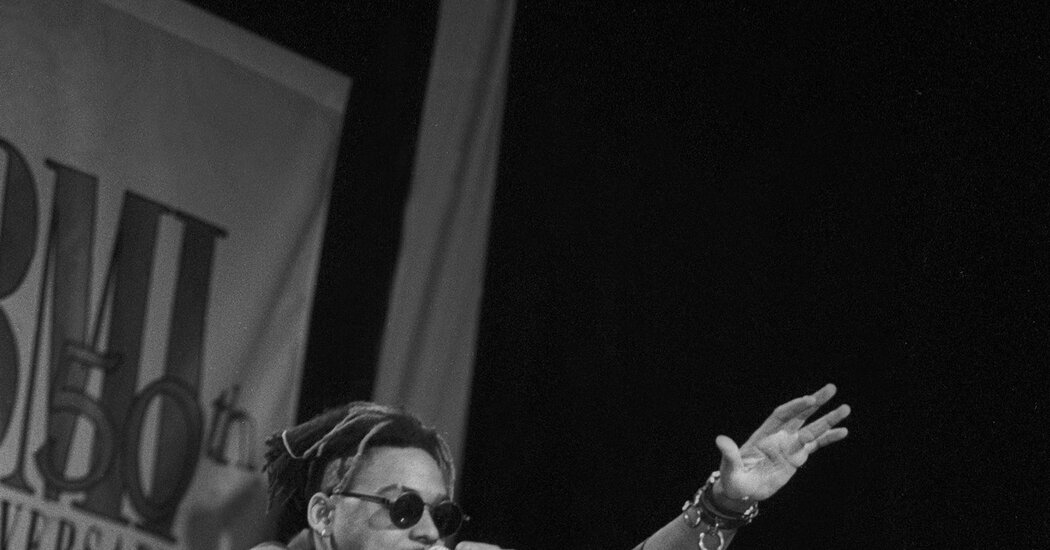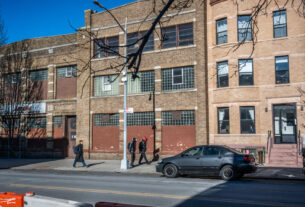In the song “Grandma Dynamite,” by the band 24-7 Spyz, the singer known as P. Fluid tells a story of growing up in the rough-and-tumble South Bronx in the 1980s.
As bullets fly, the grandmother in the song tells the singer that becoming a musician can “get you out the ghetto” and off the streets.
The success of 24-7 Spyz did just that, lifting P. Fluid, born Peter Forrest, out of his neighborhood and onto stages across the United States and Europe. He was the pioneering Black rock act’s captivating frontman as the band appeared on MTV and did shows with Nirvana, Lenny Kravitz, the Red Hot Chili Peppers and Alice Cooper.
Despite the group’s success, Mr. Forrest left 24-7 Spyz for good in the mid-90s. While his old bandmates continued to perform under the same name, he settled into an anonymous life as an ambulette driver in New York City, transporting older and disabled passengers.
On Jan. 13, some 30 years after he walked away from the band, Mr. Forrest’s remarkable life story came to a shocking end. Mr. Forrest, 64, was found beaten to death inside his ambulette at the end of Castle Hill Avenue in the Bronx, just a couple of miles from where he grew up.
Those who knew Mr. Forrest were left stunned and confounded.
“Nobody should be taken away this way,” said Jimi Hazel, the longtime guitarist for 24-7 Spyz.
A former girlfriend, Charmelle Dukes, called Mr. Forrest street-smart but nonviolent, adding, “I never saw him drink or take drugs.”
“He didn’t hang out and have enemies.” she said. “He wasn’t that guy.”
At around 8 a.m. that Monday, Mr. Forrest stopped communicating with his employer, then missed a few scheduled pickups and stopped answering his phone, the police said.
By 10 a.m., colleagues had located his vehicle using its GPS device and sent another driver to check on him. The driver found Mr. Forrest severely beaten inside his ambulette and lying face down in a pool of blood, according to the police. A window in the vehicle was smashed in.
Paramedics were summoned to the scene shortly after and pronounced Mr. Forrest dead. The chief medical examiner’s office later ruled the death a homicide resulting from injuries to Mr. Forrest’s head and torso.
Surveillance video shows a man leaving the ambulette and entering a waiting car to flee. On Friday, Sharief Bodden, 29, of the Bronx was arrested on charges of second-degree murder in connection with Mr. Forrest’s death.
Mr. Bodden, who was held without bail after being arraigned on Saturday, was also charged with drug and weapon possession. In a criminal complaint, prosecutors said he also possessed nearly 100 vials of crack cocaine. His Legal Aid lawyer did not immediately return messages seeking comment.
In his early performing years, Mr. Forrest was known to pace around the stage shirtless, wielding the microphone stand like a jousting staff, while his band played a furious mix of metal, punk and funk, Mr. Hazel’s virtuoso guitar arching to the sky. Some songs were wild jams, like their retooling of Kool & the Gang’s “Jungle Boogie.”
Mr. Forrest spent his later years living a quieter existence, staying silent about his colorful past to the neighbors in the tidy five-story walk-up he occupied off Pelham Parkway in the Bronx.
“He just went to work and came home,” said Renee Millard, a neighbor who lived across the hall from Mr. Forrest.
“Sometimes you could hear him playing guitar faintly,” Mr. Millard said. “You could tell he knew his stuff.”
Before work, Mr. Forrest would call the Palo Blanco deli across the street to order his salami sandwich and then head to the Albanian American deli below his apartment to grab lottery tickets.
“I can’t imagine a nice guy like him winding up in a tragic situation like that,” said Jack Lazri, the Albanian American deli’s owner, who like other locals described Mr. Forrest as cordial but unlikely to converse on his way to or from work.
Ms. Dukes attributed her former boyfriend’s modesty partly to his service in the U.S. Army, which she said had helped impart the discipline and commitment he brought to his art.
“He never walked around like, ‘We were on the Billboard charts,’” she said. “He didn’t brag. He just loved making music.”
Mr. Forrest was the youngest of 10 children and the son of Percy Forrest, who pitched in the Negro baseball leagues and died in 1994 at the age of 77.
Peter came of age in the Bronx in the 1970s when locals like DJ Kool Herc and Grandmaster Flash were pioneering hip-hop. B-boy culture and break dancing were all the rage.
He joined the Army as a teenager, said one of his two daughters, Nikeeda Richardson, 46.
“He wanted to escape the street and the Army did that for him, and so did his talent,” she said.
After leaving the Army, Mr. Forrest started hanging out in the East Village, becoming enmeshed in the edgy downtown music scene of the late ’80s.
He formed 24-7 Spyz with Mr. Hazel in 1986, with Rick Skatore on bass and Anthony Johnson on drums.
“Coming from the South Bronx, we all came up with a certain sensibility and it permeated the music,” Mr. Hazel said.
But there was no place to play there, he said, so they headed downtown. “The music scene was ripe with experimentation, and the music we made put us smack-dab in the middle of it,” Mr. Hazel said.
Spyz, as the group was known, was one of several prominent Black rock bands, including Living Colour, who pushed back against the stereotype that Black musicians should stick to rap and R&B.
Spyz played in storied New York venues like CBGB, the Pyramid Club and the Limelight. The group shared billing with major rock acts like Faith No More and Alice in Chains, Mr. Hazel said, as well as hardcore bands like Murphy’s Law and Agnostic Front.
Mr. Forrest’s durable voice had a wide range, and he combined a streetwise attitude with socially conscious lyrics about racism, the environment and sober living.
By 1990, Mr. Forrest had grown discontented with Spyz because of creative differences.
On the final date of the group’s tour that year with Jane’s Addiction — and with another tour planned with the punk band Suicidal Tendencies — Mr. Forrest surprised his bandmates by announcing onstage that he was quitting. After briefly returning to the group in 1995 for a European tour and another album, he quit Spyz for good.
Mr. Hazel and Mr. Skatore soldiered on with Spyz and play in the band to this day.
Mr. Forrest started other musical projects after leaving Spyz in an attempt to rejuvenate his career, but “he always had a sadness after that,” Ms. Dukes said.
Mr. Forrest enjoyed his ambulette work. “He liked helping old and disabled people, helping them walk,” Ms. Dukes said. “That made him happy.”
But he never stopped focusing on his music and continued to write, rehearse and perform.
“He always kept that same intensity toward his music,” said Ray Anderson, who began playing in bands with Mr. Forrest when they were in their early teens, and later with the BlkVampires, a Black goth-metal band fronted by Mr. Forrest that performed regularly in Manhattan clubs.
“It was his goal to reach the level he reached with Spyz, so he never lost that ambition, that drive,” Mr. Anderson said. “He always wanted to get back on top.”





